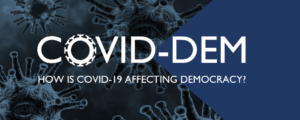 The end of 2019 marked the 14th consecutive year of decline in global freedom, but also a wave of popular movements from Iraq to Hong Kong to Venezuela demanding accountable government and rule of law, notes Chatham House, the London-based foreign affairs think-tank.
The end of 2019 marked the 14th consecutive year of decline in global freedom, but also a wave of popular movements from Iraq to Hong Kong to Venezuela demanding accountable government and rule of law, notes Chatham House, the London-based foreign affairs think-tank.
Amidst this backdrop, the United States and China have vied in increasingly confrontational ways for leadership of an emerging global order. In 2020, the COVID-19 pandemic has further sharpened the potential stakes of this competition for both defenders of democracy and aspiring autocrats. As tensions in the US-China relationship continue to escalate, the question of values and the role they play in foreign policy has been brought back onto the global stage.
Will democracy itself play a more central role in US post-crisis foreign policy? Will there be a fundamental shift in strategy if a Democratic administration takes office following November’s elections, or if President Trump secures reelection? And what does this mean for the US relationship with Europe?
 Virtual Roundtable: Democracy and US Foreign Policy
Virtual Roundtable: Democracy and US Foreign Policy
Ambassador Victoria Nuland (right), Senior Counselor, Albright Stonebridge Group; US Assistant Secretary of State for European and Eurasian Affairs, 2013 – 17, NED board member;
Dr Robin Niblett, Director and Chief Executive, Chatham House;
Chair: Dr Leslie Vinjamuri, Director, US and the Americas Programme, Chatham House.
This event will be held on the record. 23 June 2020 – 2:00pm to 3:00pm RSVP







